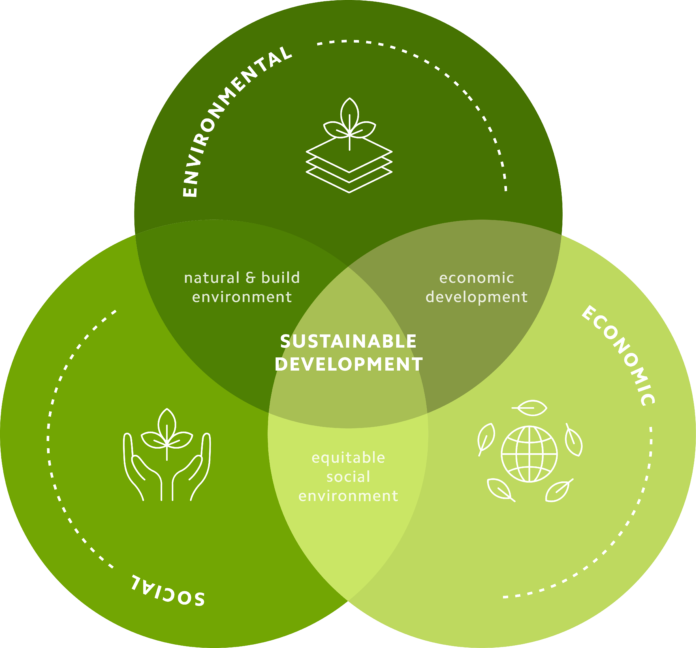In 2024, several key trends are expected to dominate the sustainability agenda. These trends reflect the growing complexity and interconnectedness of sustainability challenges and the innovative solutions and collaborations emerging to address them.
J Shiruti, Correspondent with SustainabilityNext, sifts through leading publications to collate the following trends.
The Decade of Climate Disclosure
The year 2024 marks a critical juncture in environmental reporting. With a doubling of ESG policies and an evolving regulatory landscape, transparent reporting is no longer optional but a strategic imperative for businesses worldwide. According to industry experts and the Global Reporting Initiative (GRI), this surge in disclosure aligns with growing regulatory pressures and increased stakeholder demand for transparency.
The focus will be on authentic sustainability claims, avoiding greenwashing, and embracing technological innovations for a sustainable business future.
Energy Systems and Smart Grid Development
The world’s energy delivery systems are expected to show significant strain, necessitating the prioritization and incentivisation of smart grid development. Traditional power grids, already stretched to their limits, will face increasing challenges from weather phenomena and the growth of renewables. Microgrids and innovative energy solutions will become more prominent as businesses and the public sector address future grid needs to avoid dangerous and costly failures.
Artificial Intelligence in Sustainability
In 2024, the intersection of Artificial Intelligence (AI) and sustainability is poised to deepen, offering transformative solutions across sectors. AI’s potential to optimize energy use, enhance waste management, and improve resource efficiency is increasingly recognized.
For instance, it’s revolutionizing renewable energy distribution, aiding in predictive maintenance for wind farms, and enhancing accuracy in waste sorting. Moreover, AI’s role in climate modelling and carbon footprint tracking is becoming indispensable for businesses and governments alike. However, this progress doesn’t come without challenges.
As per reports from the World Economic Forum (WEF) and the International Journal of Sustainable Development & World Ecology, AI’s potential to optimize resource use is recognized, but ethical and environmental considerations are paramount.
The substantial energy required for AI operations and the need for accurate, unbiased data are critical considerations. As we harness AI’s power for a sustainable future, balancing its benefits with ethical and environmental considerations will be paramount, ensuring that AI contributes positively to our sustainability goals without exacerbating other environmental issues.
Power Over Ethernet (PoE) and Smart Buildings
2024 might witness the rise of Power over Ethernet (PoE) technology, enabling buildings to become smarter and more energy-efficient. As building operations account for a significant portion of global CO2 emissions, PoE allows for the delivery of power and connectivity together, enabling true smart building solutions. This technology is expected to play a crucial role in reducing the carbon footprint of buildings.
Nature-Based Solutions and Climate Mitigation
According to the United Nations Framework Convention on Climate Change (UNFCCC) and the World Wildlife Fund (WWF), the importance of nature-based solutions to climate change are expected to gain traction in 2024 and in subsequent years.
Protecting forests, restoring coastal marshes, afforestation, reforestation, and sustainable land management are among the strategies that will be emphasized. These solutions aim not only to mitigate climate change but also to safeguard biological diversity, improve food security, and create more inclusive and resilient communities.
The Rise of ‘Nature Intelligence’
This concept revolves around the use of advanced technologies to understand and manage our natural environment more effectively.
Technological innovations like environmental DNA, earth observation, and AI fill the gap in nature-related data. Over 50,000 companies face new regulatory disclosure requirements, especially under the EU’s Corporate Sustainability Reporting Directive. Sources such as the European Commission and scientific journals highlight the demand for accurate, comprehensive nature-related data.
Technological innovations such as environmental DNA, earth observation, and acoustic and imaging technology, coupled with artificial intelligence, are increasingly filling this gap. These technologies enable companies to monitor biodiversity, track environmental changes, and assess the ecological impact of their operations with unprecedented precision and scale. For instance, environmental DNA allows for the detection of species in a particular habitat without physical sighting, providing crucial data for conservation efforts. Similarly, satellite imagery and remote sensing technologies offer real-time insights into land use changes, deforestation rates, and habitat destruction, informing sustainable land management decisions.
Societal Impact Through Collaboration
The changing dynamics of stakeholder relationships are pushing companies beyond traditional corporate social responsibility initiatives towards deeper, more authentic social engagement. Consumers are demanding more equitable products, employees are seeking purpose in their work, and communities are becoming more vocal about the impacts of corporate actions.
This shift is leading to an increased focus on collaborative approaches that bring together industries, governments, civil society, and other stakeholders to address the multifaceted challenges of sustainability.
For example, when IKEA Belgium decided to support housing for single-parent families, it didn’t go at it alone; instead, it partnered with community actors and non-profits, combining its resources with local expertise for a more effective and sustainable impact.
Such collaborations are not just about pooling resources; they’re about leveraging diverse perspectives, skills, and networks to innovate and co-create solutions that no single entity could achieve alone.
Expanding Corporate Board Mandate for Societal Wellbeing and Ethical AI
According to the Harvard Law School Forum on Corporate Governance and Deloitte business development report 2023, In 2024, corporate boards are expected to intensify their focus on Environmental, Social, and Governance (ESG) oversight, with a particular emphasis on ethical considerations in Artificial Intelligence (AI) and societal wellbeing.
As AI solutions become more intertwined with achieving sustainability goals and societal considerations, boards face complex trade-offs. For instance, while AI can significantly enhance efficiency and decision-making in sustainability initiatives, it also raises ethical concerns related to privacy, bias, and job displacement.
Furthermore, with increasing calls for AI regulation, boards must play a pivotal role in crafting internal AI ethics policies and contributing to shaping regulation that aligns with broader societal well-being. This expanded mandate signifies a shift from traditional corporate governance to a more inclusive and forward-thinking approach that considers the long-term impacts of business decisions on society and the environment.
Growing Focus on Carbon Accountability
The year 2024 will see a growing focus on carbon accountability, particularly with the initiation of the EU Carbon Border Adjustment Mechanism (CBAM) during its transitional phase. This mechanism requires importers to report emissions associated with their products, aiming to level the playing field for European industries and promote greener practices globally. Starting from January 2026, the permanent CBAM system will be in effect, where importers will declare annual import emissions and surrender CBAM certificates with prices linked to EU ETS allowances.
This move signifies a broader trend towards carbon accountability, where businesses are not only expected to report their emissions but also take active steps to reduce them. It reflects a shift in regulatory and market expectations, emphasizing the need for transparency and action in addressing climate change.
Unleashing Profitable and Impactful Circular Business Models
Circular business models are gaining traction as a key strategy for sustainable development. These models emphasize the importance of keeping products, components, and materials at their highest utility and value at all times, distinguishing them from the traditional linear economy of “take, make, dispose.” The circular economy is not just an environmental imperative but also a business opportunity, as it offers the potential for significant cost savings, innovation, and competitive advantage.
In 2023, as emphasized by the Ellen MacArthur Foundation and McKinsey & Company, companies are actively seeking ways to eliminate waste, maintain product and material utilization, and rejuvenate natural systems. This drive is propelled by a combination of regulatory incentives, consumer demand, and a heightened awareness of resource limitations.
This involves rethinking and redesigning products and business models to enable longevity, reuse, remanufacturing, and recycling. It also involves creating new value propositions and revenue streams, such as offering products as a service or implementing take-back schemes for end-of-life products.
To summarize, From the rise of nature intelligence to the imperative of collaborative societal impact, the trends shaping our future are not just pathways to compliance or risk mitigation; they are opportunities for transformation and growth. Businesses, governments, and individuals are called to be part of this transformative journey, leveraging the power of AI, embracing the insights of natural intelligence, and forging partnerships that drive meaningful change. The challenges are significant, but so are the opportunities for those ready to lead and invest in a sustainable future.
As we continue to navigate these trends, our collective efforts will define the legacy we leave for future generations—a world that is not only sustainable but also thriving and equitable for all. The journey towards sustainability is long and complex, but as 2024 unfolds, we are reminded that every step counts, and together, we can make a significant impact.











